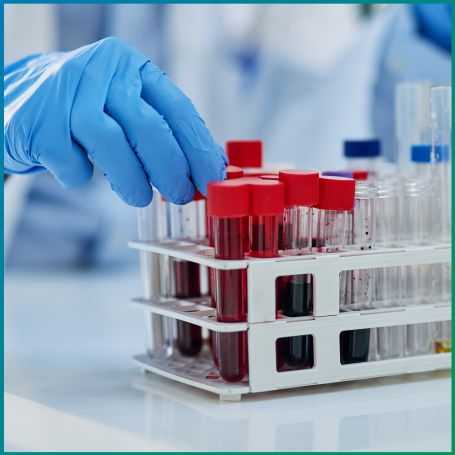
The procalcitonin test is a blood test that measures the levels of procalcitonin in the body.


Procalcitonin is a precursor to the hormone calcitonin, which regulates calcium in the blood. However, procalcitonin is typically produced in low levels and only increases in the presence of a bacterial infection, making it a useful marker for diagnosing and monitoring infections, especially sepsis and severe bacterial infections.
A procalcitonin blood test helps determine if a person has a bacterial infection. It is particularly valuable in diagnosing infections that can lead to systemic inflammation, sepsis, or other severe conditions. This test also helps monitor the progress of treatment and determine the severity of infection.
The procalcitonin test procedure is simple and non-invasive.
1] Collect a blood sample: A sample is usually taken from a vein in your arm using a needle.
2] Send the sample to the laboratory: The blood is then analyzed for procalcitonin levels.
3] Get results: The results are typically available within a few hours to a day.
1] Patients with severe infections: Individuals suspected of having sepsis or a severe bacterial infection.
2] Patients in critical care: To monitor bacterial infection progression or response to antibiotics.
3] Individuals with respiratory symptoms: Especially those who may have pneumonia or other bacterial respiratory infections.
4] Post-surgical patients: To detect any signs of infection after surgery.
Procalcitonin levels in the blood can vary based on the severity and type of infection. Results are usually measured in nanograms per milliliter (ng/mL).
1] Procalcitonin Normal Range: The normal procalcitonin levels for healthy individuals are generally less than 0.1 ng/mL. A level below this range typically means there is no significant bacterial infection present.
2] Procalcitonin Low Levels: Low procalcitonin levels (below 0.5 ng/mL) are considered normal or may indicate a mild infection or inflammation. In most cases, antibiotics may not be necessary if levels remain low, especially in patients suspected of having a viral infection.
3] High Procalcitonin Levels: High procalcitonin levels (above 0.5 ng/mL) usually suggest a bacterial infection. Depending on the specific value:
A] Levels between 0.5–2.0 ng/mL may indicate a moderate infection or localized bacterial inflammation.
B] Levels above 2.0 ng/mL can indicate a severe infection, such as sepsis. The higher the levels, the more critical the condition, necessitating immediate medical intervention.
At Diagnopein, we offer comprehensive, accurate, and timely diagnostic services, including the procalcitonin blood test. With our cutting-edge technology, and skilled technicians, you can be assured of reliable results every time. Get your results quickly, especially when time is crucial in detecting severe infections.
Competitive pricing without compromising on quality. Our team of experienced professionals ensures the test is conducted smoothly with minimal discomfort. We provide not just test results but insights into your health condition, helping you and your doctor make informed decisions about treatment. For more information call us at +91 9204 108108.
1. Procalcitonin
No special preparation is needed for the procalcitonin test. You can eat and drink as usual unless your doctor provides specific instructions.
Yes, procalcitonin levels are typically elevated in bacterial infections but not in viral infections. This helps doctors decide if antibiotics are necessary.
The test involves drawing a small amount of blood from a vein in your arm. This blood sample is then sent to a lab for analysis to measure the procalcitonin levels.
The procalcitonin test is a simple blood test with minimal risk. Some people may experience mild discomfort or bruising at the site where the blood was drawn.